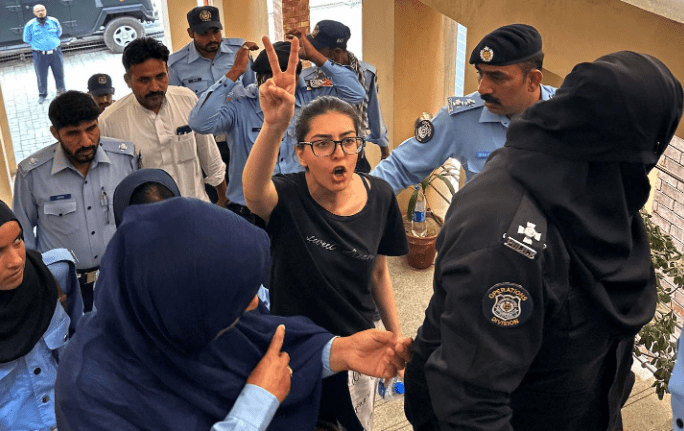
Pakistani lawyer and human rights activist Imaan Mazari’s home in Islamabad was raided by hundreds of police and undercover agents around 3:30 a.m. on August 19. They disabled the security cameras, kicked in the front door, and pulled Imaan out in front of her mother, a former minister for human rights, before putting her in the trunk of a vehicle. She was kept in her pajamas all day and not allowed to change.
About 20% of Pakistan’s population identifies as Pashtun, and two days earlier Imaan spoke at a demonstration in Islamabad organized by the Pashtun Tahafuz Movement (PTM), which campaigns for the rights of ethnic Pashtuns. She made it clear that she believes the strong military establishment in Pakistan is supporting terrorism. She informed the gathering, “The real terrorists are the ones sitting in GHQ,” alluding to the headquarters of the Pakistan Army in the heart of Rawalpindi. Each and every one of these traitorous generals and colonels need to be tried in a military court. Imaan, in her address, appealed for the release of all missing individuals who had been reportedly kidnapped by the state and an end to what she termed the U.S.-funded “dollar wars” perpetrated on the Pashtun people.
Police re-arrested Imaan on Monday afternoon, hours after the judges granted release, in a fresh case involving terrorist funding. She faces several counts, from armed robbery to domestic terrorism, and is now incarcerated. But as far as anybody can tell, she only messed up by being brave enough to say what she thought. Her attorneys claim they have been denied access to her while she is being held in a maximum-security facility. Unfortunately, this is becoming the reality of daily life in Pakistan. Following the imprisonment of former prime minister Imran Khan on May 9, 2023, violent protests against the military forces spread throughout the nation, giving the authorities an excuse to mercilessly crack down on any kind of dissent and eviscerating any semblance of democratic liberties.
Imaan Mazari is a friend of mine, and I know her well. She came to my home the morning after I was released from police prison after my arrest while covering the May 9 demonstrations. In the two years or so that we’ve been friends, she has never once said anything that might be called subversive. That she is a vocal opponent of the military’s role in politics and of the process by which Pakistan became a security state is accurate. But she has adopted these stances because she believes the actions of the military elite will lead to the Balkanization of the nation if they are not opposed.






